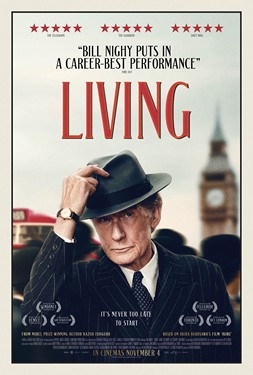
Last Saturday evening, my wife and I watched the movie Living on Netflix. I highly recommend it. I rate movies on a scale of 1 to 10. If I rate a movie a 7 or higher, I’m glad I saw it. I would rate Living as at least a 9.
If I tell you much about it, I will give away too much.
Here’s what I will say. It seems to move slowly, but after a while you realize that it moved quite quickly. The whole movie, sans credits at the end, is under 100 minutes.
Why do I mention it here? Because it’s a nice story of the stultifying effects of government bureaucracy. It takes place after World War II, when there were still a number of bombed out places in London. According to Wikipedia, it takes place in 1953. I think the date is closer to 1949. Why? Because there’s a mention of two of the characters going to see the 1949 Cary Grant/Ann Sheridan movie I Was a Male War Bride. Reruns weren’t that common in those days, so they probably saw it within months of its release.
As F.A. Hayek noted briefly in his 1944 book The Road to Serfdom, there was already a large bureaucracy controlling land use. So three women who want permission to have a park in one little bombed out area approach the “Parks” bureaucracy, where Rodney Williams, a senior bureaucrat played by Bill Nighy, works. They get shuffled from bureaucracy to bureaucracy in what seems like an endless loop. My understanding is that the three women want the government to pay for the park, so it’s not a simple “we want permission” story. Nevertheless, it does show how deadening bureaucracy is.
The stultifying effect of the bureaucracy, as we learn in the film, is not just on the citizens who want things done but also on the bureaucrats themselves.
I won’t say more. If you comment and give away some of the plot, please say, in CAPITAL LETTERS upfront, “WARNING: SPOILERS AHEAD.”


READER COMMENTS
MarkW
Jul 10 2023 at 8:41am
My wife and I have ‘Living’ in our watch list but haven’t seen it, so I can’t comment on the movie, but I will say that if you haven’t seen ‘I was a Male War Bride’, you should see that one too. It also has a light-hearted take on the absurdity of bureaucracy (military edition). And being a 40s movie, it still features some really delightfully egalitarian sex roles (before all the soft-focus, sweater-girl/gossamer gown movies of 50s). Ann Sheridan spends much of the movie driving the hapless Cary Grant around still bombed out Germany in the sidecar of a military motorcycle because she’s qualified to drive it and he isn’t. And if you like that one, follow up with ‘The Bachelor and the Bobby Soxer’, another late 40s movie featuring Myrna Loy as a judge in whose courtroom the again hapless Cary Grant appears as a defendant. Shirley Temple is really good in one of her few grown-up roles. And it’s worth the price of admission just for a scene featuring a late 1940s high-school basketball game.
David Henderson
Jul 10 2023 at 10:04am
I do remember I Was a Male War Bride. I saw it decades ago. I liked it but don’t remember any details.
Dylan
Jul 10 2023 at 10:23am
Thanks for the reminder on this one. I put it on my queue some time back, but then promptly forgot about it. I tend to like Bill Nighy in just about everything, even the not very good movies, so nice to see him get a movie that is worthy of him.
Scott Sumner
Jul 10 2023 at 1:13pm
Living is a remake of Ikiru, which is an even better Japanese film.
David Henderson
Jul 10 2023 at 2:13pm
Thanks, Scott. Yes, that was mentioned in the credits, which I always look at to the end.
Did the original take place in a bombed-out city in Japan?
Scott Sumner
Jul 10 2023 at 5:31pm
Most Japanese cities were damaged at that time, but I don’t recall exactly how much damage was shown in the film.
David Seltzer
Jul 10 2023 at 5:18pm
The Ernst Lubitsch film, Ninotchka, satirizes the Soviet Union and Joseph Stalin’s Five Year Plans. Greta Garbo is wonderful. One of my favorite lines; Count Léon d’Algout, played by Melvin Douglas, asks, “Do you like me just a little bit?” Garbo says, “Your general appearance is not distasteful.”
nobody.really
Jul 11 2023 at 12:27pm
For what it’s worth, George S. Kaufman’s & Moss Hart’s play You Can’t Take It With You (1936) includes the following exchange:
Comments are closed.